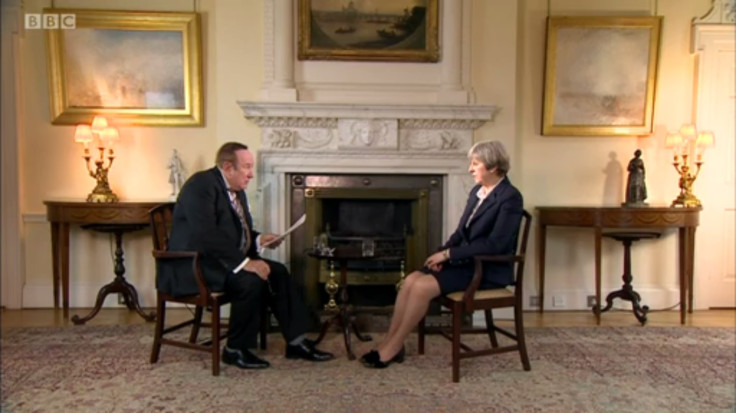Article 50: Theresa May upbeat but short on detail during Andrew Neil interview
Brexit can be finalised in 2 years, says Prime Minister - but no guarantees to EU residents in UK.
Theresa May was upbeat about the future of the UK as she was interviewed on TV by Andrew Neil after formally triggering the Brexit process. However despite the Prime Minister's positive message she was short on detail, unable to guarantee residency rights for UK citizens overseas and EU citizens in the UK, unable to rule out having to make a "divorce settlement" to leave the EU, and unable to promise a reduction in net migration.
Throughout the 30-minute interview, May repeatedly referred to the "United Kingdom", telling Neil that in her view now was not the time for a second Scottish Referendum - and implying there never would be a good time. May also agreed some sort of border control would now be necessary between the Republic of Ireland and the North, but said she hoped it would be "frictionless" - perhaps not the best phrase for a border which has often been rather the opposite.
The prime minister, looking visibly relieved to have finally got the Brexit ball rolling, began by talking of the historic moment for the country, and the opportunity to build a fairer society where all played by the "same rules." Asked by Neil if all these could not have been achieved while remaining in the EU, May replied that the people had spoken and voted for self-determination, and so that would come to pass.
The prime minister's difficult position was apparent as Neil grilled her on why she had voted Remain but was now insisting the country would be better off leaving. May was evasive, as she was about how net migration could be brought down when the Tories had been unable to limit migration from non-EU nations in the last seven years.
Challenged by Neil on whether it was even possible to complete the Brexit process within two years, the prime minister was defiant, insisting it was. "Both sides realise it is in our interests to get these arrangements in place," she said. However May was unable to provide any detail about whether UK citizens would still be entitled to free healthcare when in Europe, or even how trade will be affected by what is already beginning to seem like the start of an acrimonious - and expensive - divorce.

© Copyright IBTimes 2025. All rights reserved.






















